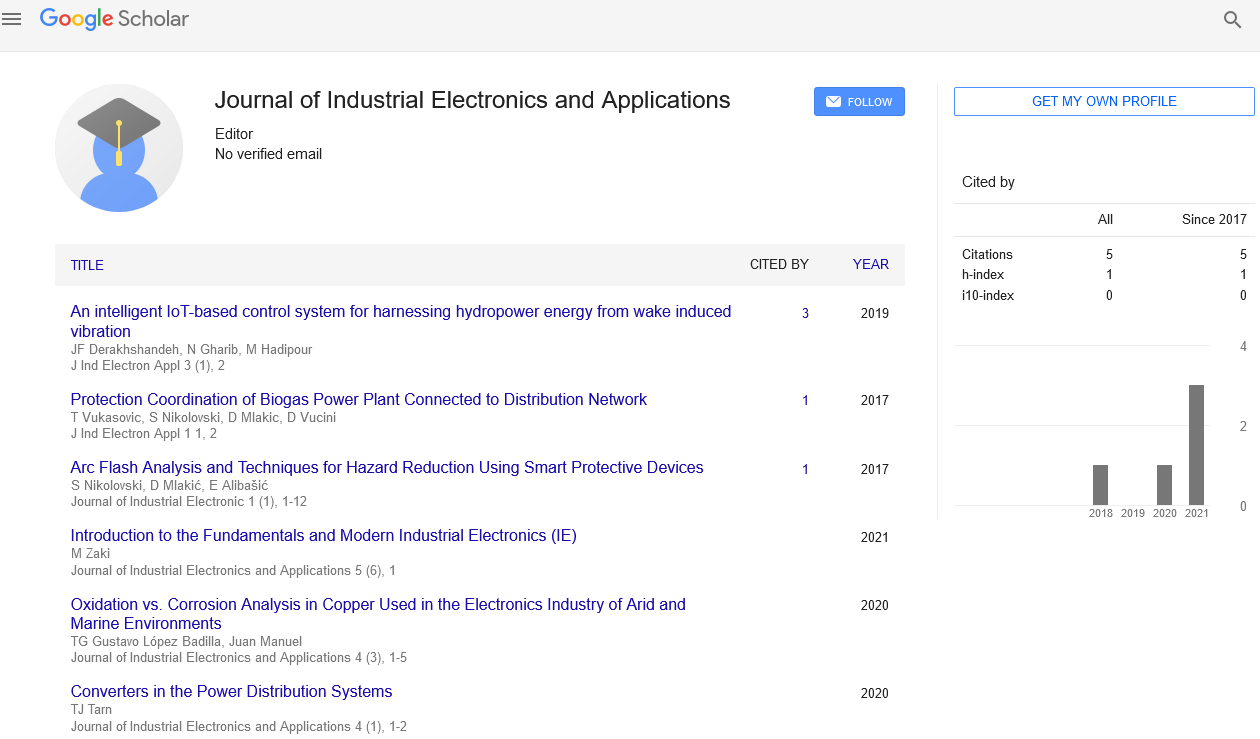Commentary, J Ind Electron Appl Vol: 7 Issue: 2
Redefining Intelligence: The Fusion of AI and Mechatronics
Zuev Bláha*
1Department of Automation and Robotics, Far Eastern Federal University, Vladivostok, Russia
*Corresponding Author: Zuev Bláha,
Department of Automation and Robotics,
Far Eastern Federal University, Vladivostok, Russia
E-mail: blaha00.av@dvfu.ru
Received date: 29 May, 2023, Manuscript No. JIEA-23-107947;
Editor assigned date: 31 May, 2023, PreQC No. JIEA-23-107947 (PQ);
Reviewed date: 14 June, 2023, QC No. JIEA-23-107947;
Revised date: 22 June, 2023, Manuscript No. JIEA-23-107947 (R);
Published date: 29 June, 2023, DOI: 10.4172/JIEA.1000027.
Citation: Bláha Z (2023) Redefining Intelligence: The Fusion of AI and Mechatronics. J Ind Electron Appl 7:2.
Abstract
Description
The integration of Artificial Intelligence (AI) and mechatronics represents a Innovative paradigm shift in the world of engineering and automation. By combining the principles of mechanical, electrical, and computer engineering with the power of AI, smart mechatronic systems are emerging, transforming industries and revolutionizing the way we interact with technology. In this commentary article, we delve into the profound impact of integrating AI in mechatronics, exploring how this synergy is advancing automation, enhancing intelligence, and paving the way for a new era of smart systems.
The Merging of mechatronics and artificial intelligence
Mechatronics, as an interdisciplinary field, has long focused on integrating mechanical and electronic components to develop intelligent and autonomous systems. With the advent of AI, the integration of smart algorithms and machine learning techniques with mechatronic systems has brought an unprecedented level of intelligence and adaptability. The combination of these disciplines has laid the foundation for a new era of smart mechatronics, where machines can learn, optimize, and make informed decisions.
AI-driven control algorithms
Traditional mechatronic systems often relied on predefined control algorithms to govern their behavior. However, by incorporating AIdriven control algorithms, these systems can adapt and learn from realtime data, optimizing their performance based on changing conditions. Reinforcement learning and neural network-based control algorithms enable mechatronic systems to continuously improve and deliver superior performance compared to static control strategies.
Sensing and sensor fusion
AI enhances the sensing capabilities of mechatronic systems by enabling sensor fusion, where multiple sensors work in tandem to gather comprehensive and accurate information about the system's environment. AI algorithms process the data from diverse sensors, such as cameras, LiDAR, and RADAR, providing a holistic view of the surroundings. This sensor fusion empowers autonomous systems like self-driving cars and robotic arms to perceive their surroundings with heightened accuracy and adaptability.
Enhanced decision-making
Integrating AI in mechatronics elevates decision-making processes to new heights. With the ability to analyze vast amounts of data in realtime, AI-powered mechatronic systems can make instantaneous decisions based on complex patterns and predictions. This level of intelligence is invaluable in critical applications like medical devices, where real-time analysis and response can make a significant difference in patient outcomes.
Robotics and autonomous systems
Robotics, as a key application of mechatronics, has been significantly impacted by AI integration. AI-powered robots can navigate through dynamic environments, learn from interactions, and execute tasks with increased precision and efficiency. Autonomous vehicles are a prime example of the successful synergy between AI and mechatronics, as they utilize AI algorithms to perceive the environment, plan optimal routes, and adapt to changing traffic conditions.
Industrial automation
In industrial settings, the integration of AI in mechatronics has revolutionized automation processes. Smart manufacturing systems equipped with AI-driven control algorithms can optimize production schedules, predict maintenance needs, and minimize downtime. Collaborative robots, or co-bots, enabled by AI, work safely alongside human workers, streamlining manufacturing workflows and increasing overall productivity.
Energy efficiency and sustainability
AI-powered mechatronic systems contribute to energy efficiency and sustainability. In smart homes and buildings, AI-controlled HVAC systems adjust heating and cooling based on occupants' preferences and real-time weather conditions, optimizing energy consumption. In renewable energy applications, AI algorithms optimize the performance of solar panels and wind turbines, making renewable energy sources more viable and reliable.
Challenges and ethical considerations
While the integration of AI in mechatronics offers transformative benefits, it comes with challenges and ethical considerations. Data privacy and security are critical aspects, as AI-powered mechatronic systems rely on vast amounts of data for learning and decision-making. Ensuring the robustness and safety of AI algorithms is also crucial, especially in safety-critical applications like autonomous vehicles and medical devices.
The future of AI-driven mechatronics
The integration of AI in mechatronics is an ongoing journey, with continued research and development opening up new possibilities. As AI technologies advance, mechatronic systems will become even more intelligent, adaptive, and self-aware. AI-powered robots will collaborate more seamlessly with humans, enabling human-robot interaction in diverse settings. Furthermore, the combination of AI with emerging technologies like quantum computing and edge computing will unlock further potential in smart mechatronics.
Conclusion
The integration of artificial intelligence in mechatronics marks a transformative era in the world of automation and smart systems. From robotics and autonomous vehicles to industrial automation and renewable energy, AI-driven mechatronics is enhancing efficiency, improving decision-making, and enabling the creation of intelligent, adaptive, and sustainable systems. As we embrace this technological revolution, it is essential to address ethical concerns, invest in research and development, and prioritize cybersecurity to ensure the responsible and secure deployment of AI in mechatronics. By doing so, we can leverage the full potential of this synergy and pave the way for a future where AI-driven mechatronics plays a central role in advancing society, industry, and the way we experience technology.
 Spanish
Spanish  Chinese
Chinese  Russian
Russian  German
German  French
French  Japanese
Japanese  Portuguese
Portuguese  Hindi
Hindi 